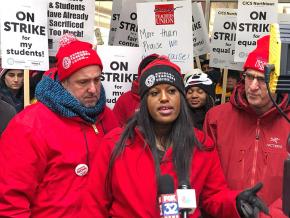The charter bosses lose again at CICS
reports from Chicago on a big win for charter school teachers — the third victory in a row after the very first charter school strike ever late last year.
AFTER A hard-fought nine-day strike, teachers and paraprofessionals at the four unionized Chicago International Charter Schools are celebrating a massive victory against a staunchly anti-union administration.
Despite smear campaigns, police harassment and an attempted freezeout at the bargaining table, the approximately 180 members of Chicago Teachers Union-Alliance of Charter Teachers and Staff (CTU-ACTS) won a contract that not only met many of their demands, but included language that could fundamentally change what educators in the charter school industry can demand — and how they can win those demands.
In addition to a guaranteed base pay increase of about 35 percent over four years, educators can look forward to paid maternity and paternity leave, more affordable health care, a stronger pension, fewer and shorter workdays, and smaller class sizes.
The classroom will benefit from sanctuary status, more money going toward teaching resources and extracurricular activities, guaranteed teaching assistants in every Kindergarten through second-grade class, as well as full-time counselors and social workers at every school.

Particularly important to many was the additional advances on health care. “Health care here is terrible,” said Tiana Ashley, a 7th grade reading teacher at CICS’s Wrightwood campus. “I have three children, and I couldn’t afford to insure them. It would take over half my paycheck, and they already didn’t pay me enough.”
Coming a few months after a union victory in the first-ever charter school strike in the U.S. at the Acero network in Chicago, the CICS contract is a concrete union victory in the world of for-profit education.
On salaries, the guaranteed increase which will put teachers on a pay scale to make 109 percent of what Chicago Public School teachers currently earn by the end of the CICS contract.
There is additional language that if CICS gets extra income through city tax revenue giveaways, investments and other sources, that money will go toward further increases in staff salaries and classroom resources, rather than bigger administrative budgets and administrator compensation. If more funding is secured, teachers could see their pay increases reach 38.7 percent by 2022.
There is a class-size limit of 28 students, with a hard cap placed at 30. Teachers in classrooms with more than 28 students will get more pay for taking on additional students, removing the incentive for administrators to allow class sizes to creep upward.
As CTU President Jesse Sharkey wrote in a statement sent to the Chicago Sun-Times:
Our members put in tremendous work at the bargaining table and on picket lines in bone-chilling weather to win major improvements for their schools. As a union of educators, our job is to teach, but we are also learning a valuable lesson from our battles with the charter industry: The interests of charter operators differ from the interests of educators and students.
CICS WENT into the strike determined to break the union. It threatened to operate through the walkout by contracting with a substitute teachers’ agency to provide scabs.
Rank-and-file members point to their varied and diverse tactics as well as constant escalation as the key to victory.
In the lead-up to the strike, the union organized a concerted media campaign to counter the dishonest smears of a CICS administration that was sitting on a $36 million war chest to fight the strike. Publicity about the agency that was to provide scab teachers upended that plan even before the strike.
As the walkout dragged on, administrators continued to take a hard line in bargaining, and CICS personnel called police on strikers.
CICS’s myriad shell companies obscured where the money was to pay teachers. But the union responded with escalating pickets and actions at several businesses, culminating in an act of civil disobedience in which dozens of educators risked arrest by blocking the lobby doors and escalators leading to PricewaterhouseCoopers, where CICS Board President Laura Thonn works.
Finally, management blinked. According to a member of the bargaining team, as late-night negotiations continued on the eve of the start of week three — with teachers more united than ever and strong public support behind them — CICS caved in a dramatic 3 a.m. deal that left one member of the charter bargaining team “in tears.”
There are many implications to this victory.
As with the Acero strike last year, CICS educators made a priority of closing the gap with public-school teachers on wages and working conditions. In several respects, the CICS teachers managed to eclipse compensation in CPS schools.
Only four out of 14 CICS schools are represented by the union. Now the union has an obvious case to make to the teachers and paraprofessionals in the 10 nonunion schools.
CICS management will be faced with the quandary of holding the line in these other schools — or increasing wages and benefits in line with the union contracts and further confirming the importance of joining the union.
More broadly, this strike calls into question the model of charter schools as an effective tool against unions and for imposing corporate education “reforms.”
This was only the third charter school strike ever in the U.S., and all three — two in Chicago and one in Los Angeles — happened in the past four months. All three ended in victory for the union. The idea that charter schools would be the end of teacher unionism has been demolished.
The CICS strike victory should embolden charter teachers across the country to get organized.


